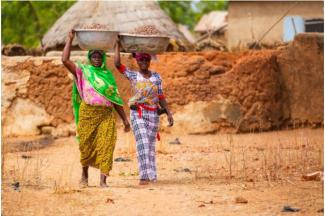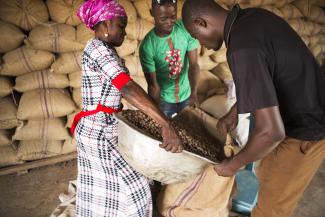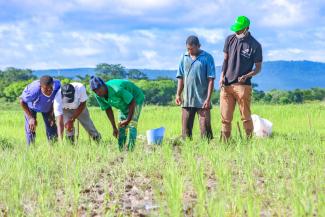Empowering West Africa in agriculture and food security, the U.S. Government’s Global Food Security Strategy (GFSS) seeks to reduce global hunger, malnutrition and poverty. USAID/WA’s GFSS brings additional financial resources to enable West Africa’s public and private sector actors to increase agricultural productivity, improve agricultural and trade policies, regulations and standards, improve food and nutrition security, while positioning the region and its member states to become self-reliant. It also contributes to building the resilience of vulnerable populations in West Africa to adapt to and recover from shocks. Additionally, reducing barriers to trade, increasing competitiveness of agricultural businesses, and expanding the availability of agricultural technologies including improved varieties of seed, is also contributing to agricultural growth and transformation in West Africa.
Sustainable Shea Initiative (SSI)
The shea industry in West Africa is rapidly expanding with demand growing by 600% over the past 20 years. Shea is now an important ingredient in food and cosmetic products worldwide, and provides a regular income for more than 16 million women who collect and process the shea kernels.
USAID/West Africa partners with the Global Shea Alliance through the Sustainable Shea Initiative (SSI) to promote the sustainable expansion of the shea industry in Ghana, Benin, Ivory Coast, Togo, Mali, Nigeria, and Burkina Faso. Since 2016, this partnership has matched USAID funds with private sector and development partner funds to provide needed skilled-based training and infrastructure to support women shea collectors.
The GSA has trained more than 213,000 women shea collectors on cooperative and business development, resulting in the formation of 277 cooperatives. With access to 264 donated warehouses, improved conservation techniques and operating as structured micro-businesses, the cooperatives are linked to a commercial off-taker for trading of shea kernels and/or butter. The GSA also launched the Action for Shea Parklands aimed at planting 10 million shea trees in 10 years – a response to the continuous destruction of shea parklands.
ENHANCING GROWTH THROUGH REGIONAL AGRICULTURAL INPUT SYSTEMS (ENGRAIS)
EnGRAIS is a five-year (2018 – 2023) Feed the Future program, which seeks to sustainably increase regional availability and use of appropriate and affordable fertilizers for smallholder farmers in West Africa. It promotes a competitive, inclusive, and private sector-led, regional fertilizer market, strengthened through increasing the management capacity and sustainability of the West African Fertilizer Association (WAFA) and other relevant regional private sector organizations/associations and industry actors.
In close consultation and partnership with the Economic Community of West African States (ECOWAS), and the West and Central African Council for Agricultural Research and Development (CORAF), the program is developing and providing fertilizer, seed, and good agricultural practice recommendations for key crops and agro-ecological zones in West Africa and Chad. See: Fertilizer and Seed Recommendations for West Africa map). This program has also incentivized over $35 million in increased investment in the fertilizer sector in West Africa and facilitated the arrangement of a $520 million line of credit from the ECOWAS Bank for Investment and Development to WAFA’s members to provide additional financing for production, procurement and/or blend and supply of needed fertilizers.
When COVID-19 began and threatened agriculture and food systems in West Africa in 2020, EnGRAIS quickly responded by publishing the West Africa Fertilizer Watch that provided important information and analysis on fertilizer supply/stocks, logistics, access, and policy situations. This led to regional governments declaring fertilizers as “essential” commodities whose movement would not be restricted, ensuring that farmers across West Africa had enough fertilizers before the start of the 2020 planting season.
USAID/West Africa and Permanent Interstate Committee for Drought Control in the Sahel (CILSS)
Currently, the Sahel and West Africa are facing a major food and nutrition crisis for the second consecutive year, with 27.1 million people possibly affected. Security issues are leading to large flows of internally displaced persons, and the COVID-19 pandemic is having a detrimental impact on the lives of communities and economies.
It is often the case that food crises are caused by: poor prevention and management systems at both the national and regional level; late and unreliable information; lack of precision and inadequacy in targeting affected areas and populations; and lack of coordination and synergy.
A swift and co-ordinated response is needed alongside strengthened political commitment to finding more sustainable ways of addressing recurrent crises and the growing need for food assistance across the region.
CILSS works together with different actors to help prevent severe food shortages, loss of lives and livelihoods. Through the Cadre Harmonizé for the Identification of Risk Areas and Vulnerable Populations and the Regional Mechanism for Food Crisis and Management in the Sahel and West Africa (PREGEC), food and nutrition security is monitored so that member states can ascertain the right mix of assistance in a timely manner when tackling the effects of food and nutrition insecurity. Early warning systems are also helping member states to manage their response to food crises in a more effective way than before, to put in place food risk mitigation measures, and mobilize security stocks of food and non-food items.

Photo credit: GSA

Photo Credit: GSA

Felix Deyegbe/IFDC

Photo credit: CORAF

Photo credit: Dr. Issa Garba, AGRHYMET/CILSS
